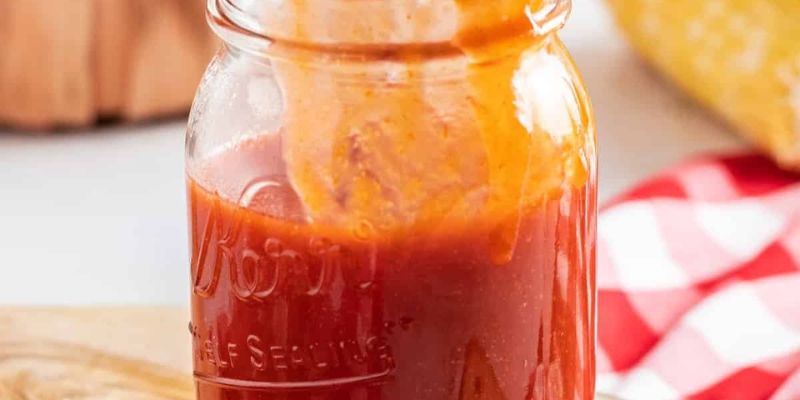Barbecue sauce is a staple condiment for many people, but traditional store-bought options can be high in carbs and sugar. If you're following a low-carb or no-sugar-added diet, fear not! You can still enjoy the delicious barbecue flavors with this easy DIY recipe.
Understanding Low-Carb and No Sugar-Added BBQ Sauce
In BBQ sauce, "low-carb" contains fewer carbohydrates than traditional BBQ sauces. Carbohydrates are macronutrients in foods like sugar, flour, and grains. By reducing the amount of carbohydrates in BBQ sauce, manufacturers aim to provide a healthier option for individuals following a low-carb or ketogenic diet.
"No sugar-added" refers to a BBQ sauce containing no added sugars. Traditional BBQ sauces often contain high levels of sugar, which can contribute to weight gain, increased blood sugar levels, and other health issues. By eliminating added sugars in BBQ sauce, manufacturers cater to individuals looking to reduce their sugar intake for overall health reasons.

Importance of reducing carbs and sugar
Reducing carbs and sugar in our diets is essential for overall health for several reasons. Excessive consumption of these nutrients has been linked to obesity, diabetes, heart disease, and other chronic conditions.
Carbohydrates, especially those from refined sources like white bread and sugary drinks, can cause spikes in blood sugar levels and lead to weight gain. High sugar intake can also contribute to tooth decay and increase the risk of developing metabolic syndrome.
Reducing carbs and sugar in our diets can promote weight loss, stabilize blood sugar levels, lower the risk of chronic diseases, and improve overall well-being. It is important to remember that while low-carb and no-sugar-added options may benefit some individuals, moderation and a balanced diet are essential.
It is always recommended to consult with a healthcare professional or registered dietitian before making significant changes to your diet.
Creating Your Own Low-Carb and No Sugar-Added BBQ Sauce
You will need the following low-carb and sugar-free BBQ sauce ingredients:
- Tomato paste: 1 cup
- Apple cider vinegar: 1/2 cup
- Soy sauce or tamari: 2 tablespoons
- Worcestershire sauce: 2 tablespoons
- Dijon mustard: 1 tablespoon
- Garlic powder: 1 teaspoon
- Onion powder: 1 teaspoon
- Smoked paprika: 1 teaspoon
- Liquid smoke: 1/2 teaspoon (optional for smoky flavor)
- Natural sweetener of your choice: Stevia, erythritol, or monk fruit sweetener to taste
How do you prepare the low-carb BBQ sauce?
- In a medium saucepan, combine the tomato paste, apple cider vinegar, soy sauce or tamari, Worcestershire sauce, Dijon mustard, garlic powder, onion powder, smoked paprika, and liquid smoke (if using).
- Heat the saucepan over medium heat and whisk all the ingredients until well combined.
- Taste the sauce and adjust the seasoning to your preference. If you want it sweeter, add your natural sweetener gradually, tasting as you go.
- Bring the sauce to a gentle simmer and cook for 10-15 minutes, stirring occasionally to prevent sticking or burning.
- Once the sauce has thickened and the flavors have melded together, remove it from the heat and let it cool.
- Transfer the BBQ sauce to an airtight container and store it in the refrigerator for up to two weeks.

Tips to follow
- If you prefer a smoother consistency, use a blender or immersion blender to puree the sauce after cooking.
- Feel free to adjust the spices and seasonings to suit your taste. You can add more or less garlic powder, onion powder, or smoked paprika, based on your preference.
- If you like a spicier BBQ sauce, add a pinch of cayenne pepper or a few dashes of hot sauce.
- This low-carb and no-sugar-added BBQ sauce can be used as a marinade, glaze, or dipping sauce for grilled meats, vegetables, or tofu.
Enjoy your homemade low-carb and no-sugar-added BBQ sauce!
Health Benefits of Low-Carb and No Sugar-Added BBQ Sauce
Using homemade sauce can have several advantages regarding reducing added sugars and controlling carb intake. Many store-bought sauces are packed with added sugars and preservatives, which can contribute to weight gain and negatively impact blood sugar control.
By making your sauce at home, you have complete control over the ingredients and can choose to use natural sweeteners or reduce the amount of sugar altogether. It can be especially beneficial for individuals with diabetes or those looking to manage their blood sugar levels.
Additionally, homemade sauces allow you to customize the flavors according to your preferences and dietary needs. You can experiment with different herbs, spices, and seasonings to create a sauce that suits your taste buds while also being healthy. It can make mealtime more enjoyable, as you have the freedom to create unique and flavorful dishes.
Another advantage of homemade sauce is that it can support weight management efforts. Store-bought sauces often contain hidden calories and unhealthy fats, which can contribute to weight gain over time.
By making your sauce, you can use fresh and wholesome ingredients, such as fresh tomatoes or herbs, which are lower in calories and rich in essential nutrients. It can help you maintain a healthy weight or support weight loss goals.
In addition to reducing added sugars and controlling carb intake, homemade sauce can also have long-term health benefits. By consuming less added sugar, you can reduce the risk of chronic diseases such as obesity, type 2 diabetes, and heart disease.
Homemade sauce can also improve blood sugar control, allowing you to choose ingredients with a lower glycemic index. It can be essential for individuals with diabetes or those at risk of developing the disease.
Conclusion
With this easy DIY recipe for low-carb and no-sugar-added BBQ sauce, you can enjoy all the deliciousness of barbecue without compromising your dietary restrictions. Give it a try and see how tasty homemade can be!




